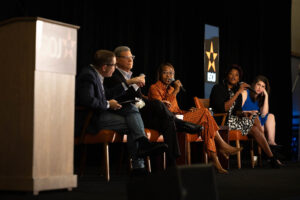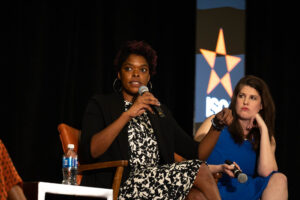Journalists indulged in a lively, and occasionally profane, discussion of media coverage of U.S. election cycles and the upcoming presidential election during an April 13 panel at the 25th ISOJ centered around the question, “The media and election season: Are we gonna get it right this time?”
 The panel, which featured four top-notch journalists, was moderated by Evan Smith, co-founder of The Texas Tribune and a senior advisor at the Emerson Collective. Panelists examined the media’s coverage of the 2016 and 2020 presidential elections, as well as best practices for the 2024 election.
The panel, which featured four top-notch journalists, was moderated by Evan Smith, co-founder of The Texas Tribune and a senior advisor at the Emerson Collective. Panelists examined the media’s coverage of the 2016 and 2020 presidential elections, as well as best practices for the 2024 election.
Shawna Thomas, an executive producer for CBS News’ CBS Mornings, said the media didn’t take Donald Trump seriously when he first ran for president in 2016. She said most people knew Trump from his role in “The Apprentice” and appearances in the New York Post — in other words, as a celebrity.
“I do not think we totally understood who Donald Trump was,” Thomas said. “We were learning as the voting base was learning, too, that we didn’t understand the power of what he was doing.”
It was only after Trump was elected president that journalists began taking him seriously, Thomas said. She said that while she doesn’t believe journalists have anything to apologize for, they should — and did — learn from that experience.
“We were not listening to the people and the public in the same way that I think we are better at now,” Thomas said. “And I’m saying we as a collective we, maybe I’m just really talking about myself.”
Charlie Sykes, a contributor and columnist at MSNBC, said there’s been a “general failure of journalism” in covering presidential elections.
“Answering your question, ‘Are we gonna get it right this time?’, you’re not going to like this, but the answer is no,” Sykes said. “I think there’s a real possibility that we’ll be even worse this time.”
Since 2016, the media has been “broken and shattered,” Sykes said. He noted the destruction of print media, the fragmentation of other forms of media and worsening climates for misinformation on social media platforms like X/Twitter.
“Even though there’s a sentiment (that) yes, we’ve learned a lesson, the reality is that the model has been broken so badly,” Sykes said.
Sykes described the 2024 election as an “81-year-old guy running against somebody with 91 felony charges.”
“Yet there is a tendency of many journalists to mute the crazy,” Sykes said. “There’s a danger of succumbing to the banality of crazy, of being sucked into the horse race, of treating it as a show rather than of substance.”
Sykes said that although there’ll be “some of the best journalism of our lives this year,” the voters that most need that journalism will not see it or will not believe it. He said this mainly comes down to the isolation of journalism and lack of trust in the media.
“The age of mass media is over,” Sykes said. “We’re talking about a completely different media universe and too many journalists continue to act as if it’s still 1976.”
Abby Livingston, a senior congressional reporter at Puck, said she went to college at UT during the second Iraq War. It was during this time that she said she realized the failure of the press corps, which drove her desire to do better.

Shawna Thomas, left, an executive producer for CBS News’ CBS Mornings, makes a point about election coverage. Abby Livingston, a senior congressional reporter at Puck, looks on at the 25th ISOJ on April 13. (Patricia Lim/Knight Center)
“We fast forward to election night 2016: It never crossed my mind based on everything I’d ever learned about American politics that Donald Trump would become president until 10 o’clock on election night,” Livingston said.
Livingston said Trump’s victory blew apart everything she’d learned about how campaigns, polling and fundraising worked. She said she believes journalists should be less focused on polling and predicting election results.
“We try to make it algebra and at the end of the day people go into a voting booth and they do weird things,” Livingston said.
Errin Haines, editor at large at The 19th, said many Black journalists realized that Trump would likely win the 2016 election, but weren’t listened to.
She said journalists must be prepared to cover what happens on election day, but also what will happen after the election — which journalists weren’t prepared enough for in 2020.
“Do we have anything to solve for? Absolutely,” Haines said. “And are we gonna get this right? We fucking better.”
ISOJ is a global online journalism conference organized by the Knight Center for Journalism in the Americas at the University of Texas at Austin. In 2024, it is celebrating 25 years of bringing together journalists, media executives and scholars to discuss the impact of the digital revolution on journalism.
* Naina Srivastava is a first-year journalism student at UT Austin. She is currently a senior news reporter and senior photographer for the Daily Texan, and an intern at the Austin Chronicle.